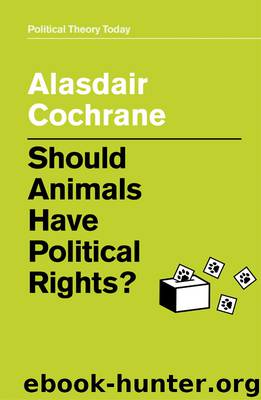Should Animals Have Political Rights? by Alasdair Cochrane

Author:Alasdair Cochrane [Cochrane, Alasdair]
Language: eng
Format: epub
Publisher: Wiley
Published: 2019-12-05T00:00:00+00:00
What’s the point of legal personhood?
But while animals might merit legal personhood because of their sentience, would award of personhood actually do them any good? Would recognizing their personhood also ensure respect for their intrinsic value? One powerful and commonly heard argument is that animals need legal personhood in order that they can be ‘rights holders’ (Francione 1995; Wise 2000). However, there is good reason to question the idea that legal personhood will suddenly transform animals into rights holders. For the fact is, as we have seen in previous chapters, animals are already rights holders; and they are rights holders irrespective of the fact that they have been denied the status of persons. To explain, and as we saw in the introduction to this book, a very common understanding of rights is that they are ‘protected interests’. Essentially, rights are those interests which impose duties on others for the sake of the interest holder. On this understanding, and as was discussed in chapter 2, animal welfare laws can and do provide meaningful rights to animals. Take, for example, New Zealand’s 1999 Animal Welfare Act, which banned using great apes in research, testing and teaching except where such uses are in the animals’ best interests. This ban certainly protects the basic interests of great apes in not suffering, in continued life, in not being confined in research facilities, and so on. And it also imposes duties on researchers in New Zealand not to subject great apes to these kinds of procedures. In this light, it only seems correct to describe great apes in New Zealand as having a right not to have research experiments conducted upon them.
Now it is true that the kinds of rights which animal welfare law provides are not fundamental rights – that is to say, they are not constitutionally entrenched in the same way that some human rights and freedoms are. For this reason, these ‘legislated rights’ ordinarily have less weight than those which are entrenched. In light of this, while I do not think we can say that legal personhood would transform animals into rights bearers, it would open the door for them to enjoy rights of an equivalent standing and weight to the constitutional rights of humans.
And this shows the importance of legal personhood for animals: it gives animals the same legal status as humans; it puts them on the same legal footing as other persons, meaning that their interests cannot be subordinated. None of this means that animal rights will always win out when they clash with those of humans; human interests and rights can still prevail. But when humans and animals have an equal legal status, for human interests to prevail, they must have been weighed fairly and equally against those of animals. When sentient animals have legal personhood, then, human interests should win out during conflicts when they are stronger and weightier – that is, when they are more important to living well – and not simply because they belong to humans.
In
Download
This site does not store any files on its server. We only index and link to content provided by other sites. Please contact the content providers to delete copyright contents if any and email us, we'll remove relevant links or contents immediately.
The Lonely City by Olivia Laing(4120)
Animal Frequency by Melissa Alvarez(3755)
All Creatures Great and Small by James Herriot(3517)
Walking by Henry David Thoreau(3234)
Exit West by Mohsin Hamid(3184)
Origin Story: A Big History of Everything by David Christian(3139)
COSMOS by Carl Sagan(2950)
How to Read Water: Clues and Patterns from Puddles to the Sea (Natural Navigation) by Tristan Gooley(2855)
Hedgerow by John Wright(2777)
The Inner Life of Animals by Peter Wohlleben(2767)
Origin Story by David Christian(2684)
How to Read Nature by Tristan Gooley(2665)
Project Animal Farm: An Accidental Journey into the Secret World of Farming and the Truth About Our Food by Sonia Faruqi(2661)
How to Do Nothing by Jenny Odell(2645)
A Forest Journey by John Perlin(2588)
Water by Ian Miller(2584)
The Plant Messiah by Carlos Magdalena(2454)
A Wilder Time by William E. Glassley(2364)
Forests: A Very Short Introduction by Jaboury Ghazoul(2335)
